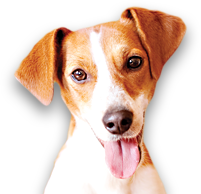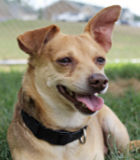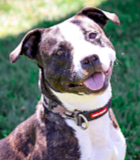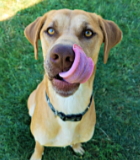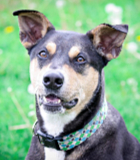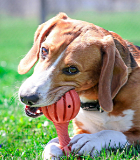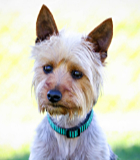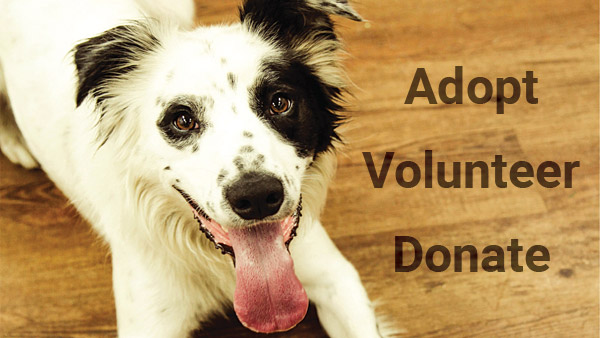PUPPY MOUTHING AND NIPPING
- This topic has 0 replies, 1 voice, and was last updated 16 years, 4 months ago by
Mackenzie’s Admin.
-
AuthorPosts
-
January 23, 2009 at 12:06 am #312
Mackenzie’s Admin
MemberPuppies love to play with people. They’ll chew on your fingers and toes, and investigate the rest of you with their mouths and teeth. It may be cute with they’re seven weeks old, but not nearly so endearing at the ripe old age of five months. One possible solution? Bite inhibition.
For puppies, much of playtime is spent using their mouths and needle-sharp teeth to chew and investigate objects. These activities are normal, harmless puppy activities—unless you’re the object being chewed and investigated! Puppies love to play with people. They chew on their fingers and toes, and they investigate people’s bodies with their mouths and teeth. These behaviors may be considered cute when the puppy is seven weeks old, but are not nearly so endearing when the puppy is four or five months old. Although mouthing and nipping tend to diminish as the puppy matures, here are some helpful tips to get you through your pet’s teething period:
What to do:
– Substitute a toy or chew bone when the puppy tries to chew on fingers or toes.
– Puppies tend to mouth hands whenever stroked and patted. When you pat the puppy, distract him by feeding tiny pieces of treat from your other hand. This will accustom the pup to being touched without mouthing.
– Give a high-pitched yelp, as if you are in pain, when the puppy bites too hard. This should startle the puppy and cause him to stop, at least momentarily. Praise the puppy for stopping and/or for licking you.
– Time out can be effective, especially for curbing mouthing in older puppies and adolescent dogs. When you receive a hard bite, give a high-pitched yelp and (a) walk away from the puppy and ignore for 30-60 seconds, OR (b) leave the room for 30-60 seconds. Option B is only feasible if your belongings will be safe from the puppy and if the puppy will be safe left where he is.
– Encourage non-contact forms of play, such as fetch and tug-of-war, rather than wrestling and rough play.
– Provide plenty of interesting and novel toys so the puppy will be inclined to play with these.
– Provide plenty of opportunity for your dog to play with other puppies and with friendly adult dogs. It’s important that he can engage with non-human playmates.
– Be patient and understanding. Playful mouthing is normal behavior for a puppy or young dog.What not to do:
– Avoid enticing the puppy to play by waving your fingers or toes in his face or slapping the sides of his face.
– You should not discourage the puppy from playing with you. Play builds a strong bond between the dog and his human family. The objective is to teach the puppy to play gently—not to stop play altogether. – Avoid jerking your hands or feet away from the puppy when he mouths. This encourages him to jump forward and grab at you. It’s much more effective to let your hands or feet go limp so you aren’t much “fun” for him to mouth.
– Physical punishment for playful mouthing (slapping, hitting, etc.) can make the puppy afraid of you and could even cause the mouthing to escalate into aggression. We’ve heard of various “caveman” methods such as scruff shaking, whacking the pup on the nose, sticking fingers down a pup’s throat—these are cruel and inhumane.Bite Inhibition
Teaching a puppy to modify his mouthing behavior is an opportunity to teach him bite inhibition. Bite inhibition refers to a dog’s ability to control and inhibit the force of his mouthing. A puppy or dog who hasn’t learned bite inhibition may not recognize the sensitivity of human skin and bite too hard, even in play. Some behaviorists and trainers maintain that a dog who understands the amount of force necessary to hurt people, if ever in a situation where he does actually bite a person in a non-playful manner, will be less likely to bite and break skin.
To teach your puppy bite inhibition, first you will encourage him to play with your hands. Continue play until the puppy bites especially hard. Immediately give a high-pitched yelp and let your hand go limp. When the puppy startles and turns to look at you or looks around, remove your hand. Ignore the puppy for 10-20 seconds or, if he resumes mouthing, get up and move away for 10-20 seconds.The next step is to return and encourage the puppy to play with you again. This is critical for teaching the puppy that if he is gentle, play continues–but if he is too rough, play stops. Play with the pup until he bites hard again and repeat the sequence. As you detect that the puppy is inhibiting those really hard bites, target slightly less painful bites. Persist with the process until the puppy can play with your hands but control the force of his bites to the extent that you feel little or no pressure at all. This can take as little as a day, or as long as a few weeks.
When Mouthing Become Aggression
Puppies sometimes have temper tantrums. Usually a tantrum will happen when you are making the puppy do something he doesn’t want to do. This might be as benign as simply handling or restraining him. A tantrum can also occur when play escalates, much the same as when children play and one child gets upset and angry. A puppy temper tantrum involves more than playful mouthing, but it isn’t always easy to tell the difference.
Possible indicators that your puppy is having a tantrum include:
– He may become quite stiff in his body.– He may pull his lips back to expose his teeth.
– Almost always, the bites directed toward your hands will be much more painful than what he may inflicts during play.
If you think your puppy is having a tantrum, it’s best to take a firm hold on him, tell him, “That’s enough!” and immediately carry him to a quiet, confined area, such as a small room or his crate. Leave the puppy for no more than five minutes. When you return, resume whatever you were doing with the puppy before the temper tantrum–assuming it was something the puppy needs to learn, such as how to remain still for body inspection or during grooming, or if you were attempting to teach him appropriate play behaviors
Some puppies may exhibit behavior that goes beyond the basic tantrum. If you believe that your puppy is biting aggressively, you should definitely seek help from a Certified Applied Animal Behaviorist, Veterinary Behaviorist, or Certified Professional Dog Trainer.
-
AuthorPosts
- You must be logged in to reply to this topic.

